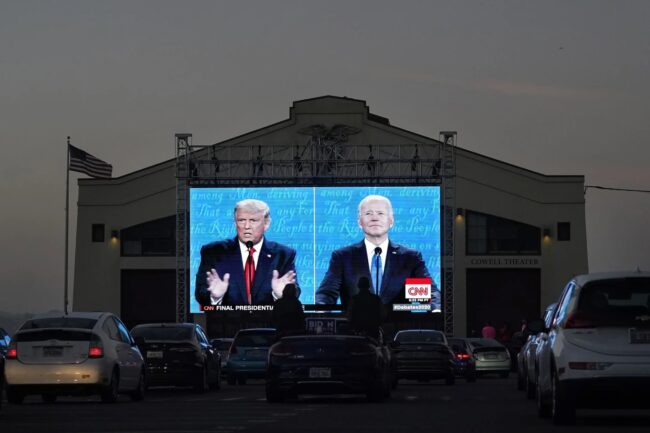‘Uncommitted’ votes show discontent in presidential options

Though President Joe Biden and former President Donald Trump have both won enough delegates to secure their respective places as presumptive nominees for the Democratic and Republican parties, there is a movement to vote for a party but for no one in particular: this is the uncommitted vote. It is a separate choice and not the same as straight party voting.
The goal of an uncommitted vote is a protest to the existing system. The exact reasons for protest vary from person to person, but together these votes can be an effective way to show the desire for change.
It can be used to pressure candidates to change their policies in order to win more votes.
Biden, 81, is currently the oldest serving president in U.S. history and Trump, who turns 78 in June, currently faces both civil and criminal charges. This leaves many voters feeling disinterested or conflicted about the upcoming election. The uncommitted vote is one way they are expressing their discontent.
Steven Shepard wrote for Politico that the uncommitted vote could “jolt Biden” in the upcoming primaries for Kansas, Missouri, Connecticut, Rhode Island, Wyoming, Maryland, Kentucky, Montana, New Jersey, and New Mexico. However, the results would not be identical everywhere, because each state’s voters have differing ideologies.
The city government website for Portage, Michigan, explains that “if enough voters cast ‘uncommitted’ votes, the party may send delegates to the national nominating convention who are not committed to a specific candidate.” In this way, Minnesota will send 11 uncommitted delegates to the national convention. Supporters of the movement include Rep. Rashida Tlaib (D-Mich.).
There were about 100,000 uncommitted votes in Michigan’s democratic primary, representing 13% of the vote. In Minnesota, 45,000 uncommitted votes accounted for 19% of the vote. In Hawaii, 910 uncommitted votes accounted for 29% of the vote. In Washington, uncommitted votes amount to nearly 10%.
Campaigners for Vote Uncommitted MN said that although they campaigned just weeks before primaries and on a tight budget, this turnout was much greater than anticipated. Part of the equation for many uncommitted votes in Minnesota was a campaign in Muslim communities to put pressure on Biden to call for a ceasefire in Palestine.
Data for Progress reports that “around two-thirds of voters (67%) — including majorities of Democrats (77%), Independents (69%), and Republicans (56%) — support the U.S. calling for a permanent ceasefire and a de-escalation of violence in Gaza.” These numbers are up from their previous polls in November.
Since Minnesota’s primary, Biden has inched in the direction of this aim, sending both food to Gaza and military aid to Israel. Adding pressure, the Irish Prime Minister pushed for an “immediate humanitarian ceasefire” in a March 15 meeting with Biden at the White House. Earlier in March, Vice President Kamala Harris called the bombing in Gaza a ‘humanitarian catastrophe’ while negotiations continued.
“Our hearts break for the victims of that horrific tragedy and for all the innocent people in Gaza who are suffering,” Harris said.
As public pressure continues to mount on the Biden Administration to change its position on Gaza, the uncommitted vote shows a protest that could factor in this presidential election.

